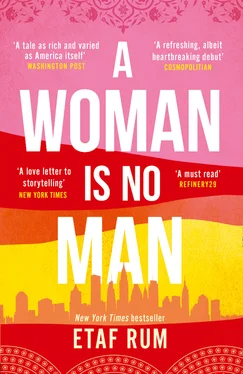“Nasser would make a fine husband,” Fareeda said. “He’ll be a doctor someday. He’ll be able to give you everything you need. You’d be a fool to turn him down. Proposals like this don’t come around every day.”
“But I’m only eighteen, Teta. I’m not ready to get married.”
“You act like I’m selling you off to slavery! Every mother I know is preparing her daughter for marriage. Tell me, do you know anyone whose mother isn’t doing exactly the same thing?”
Deya sighed. Her grandmother was right. Most of her classmates sat with a handful of men every month, yet none of them seemed to mind. They slicked on makeup and plucked their brows, as though eagerly waiting for a man to scoop them away. Some were already engaged, wrapping up their final year of high school as if by force. As if they’d found something in the prospect of marriage so fulfilling that no amount of education could compare. Deya would often look at them and wonder: Isn’t there more you want to do? There must be more. But then her thoughts would shift, and uncertainty would kick in. She’d start to think maybe they had it right after all. Maybe marriage was the answer.
Fareeda moved closer, shaking her head. “Why are you making this so difficult? What more do you want?”
Deya met her eyes. “I already told you! I want to go to college!”
“ Ya Allah .” She drew out her words. “Not this again. How many times do I have to tell you? You’re not going to college in this house. If your husband allows you to get an education after marriage, that’s his decision. But my job is to secure your future by making sure you and your sisters are married off to good men.”
“But why can’t you secure my future by letting me go to college? Why are you letting some strange man control my fate? What if he turns out like Baba? What if—”
“Not another word ,” Fareeda said, her upper lip twitching. “How many times have I told you not to mention your parents in this house?” From the expression on her face, Deya could tell Fareeda wanted to slap her. But it was true. Deya had seen enough of her mother’s life to know it wasn’t the life she wanted.
“I’m afraid, Teta,” Deya whispered. “I don’t want to marry a man I don’t know.”
“Arranged marriages are what we do,” Fareeda said. “Just because we live in America, that doesn’t change how things are.” She shook her head, reaching inside the cabinet for a teakettle. “If you keep turning down proposals, the next thing you know, you’ll be old and no one will want to marry you, and then you’ll spend the rest of your life in this house with me.” She caught Deya’s eyes. “You’ve seen other girls who’ve disobeyed their parents, refusing to get married, or worse, getting divorced, and look at them now! Living at home with their parents, their heads hanging in shame! Is that what you want?”
Deya looked away.
“Listen, Deya.” Fareeda’s voice was softer. “I’m not asking you to marry Nasser tomorrow. Just sit with him again and get to know him.”
Deya hated to admit Fareeda was right, but she found herself reconsidering. Maybe it was time to get married. Maybe she should accept Nasser’s proposal. It wasn’t as if she had a future in Fareeda’s house. She could barely go to the grocery store without supervision. Besides, Nasser seemed nice enough. Better than the other men she’d met over the months. If not him, then who? Eventually, she’d have to agree to someone. She could only refuse for so long. Unless she wanted to ruin her reputation and her sisters’ reputations as well. She could hear their neighbors in her head. That girl is bad. She isn’t respectable. Something must be wrong with her.
Deya agreed. There was something wrong with her: she couldn’t stop thinking, couldn’t make up her mind.
“Fine,” she said. “Okay.”
Fareeda’s eyes sprung wide. “Really?”
“I’ll see him again. But only under one condition.”
“And what’s that?”
“I’m not leaving Brooklyn.”
“Don’t worry.” Fareeda forced a tight smile. “He lives right here in Sunset Park. I know you want to be near your sisters.”
“Please,” Deya said. “When the time comes, will you make sure they marry in Brooklyn, too?” She spoke softly, hoping to elicit some sympathy. “Can you make sure we stay together? Please.”
Fareeda nodded. Deya thought she saw the wetness of tears in her eyes. It was an odd sight. But then Fareeda looked away, twisting her scarf with her fingers.
“Of course,” Fareeda said. “That’s the least I can do.”
FAREEDA MIGHT HAVE forbidden Deya from speaking of her parents, but she couldn’t erase her memories. Deya clearly remembered the day she had learned of Adam’s and Isra’s deaths. She had been seven years old. It was a bright autumn day, but Deya had watched the sky turn a dull silver through her bedroom window. Fareeda had finished clearing the sufra after dinner, washed the dishes, and slipped into her nightgown before creeping downstairs to the basement, where they had lived with their parents. Deya knew something was wrong the minute her grandmother appeared at the doorway. As far back as she could remember, she had never seen Fareeda in the basement.
Fareeda had checked to see if Amal, the youngest of the four, was asleep in her crib, before sitting on the edge of Deya and her sisters’ bed.
“Your parents—” Fareeda took a deep breath and pushed the words out. “They’re dead. They died in a car accident last night.”
After that, it was all a blur. Deya couldn’t remember what Fareeda said next, couldn’t picture the looks on her sisters’ faces. She only remembered disparate bits. Panic. Whimpering. A high-pitched scream. She had dug her fingers into her thighs. She had thought she was going to throw up. She remembered looking out the window and noticing that it had started to rain, as if the universe was grieving with them.
Fareeda had stood up and, weeping, went back upstairs.
That was all Deya knew about her parents’ death, even now, more than ten years later. Perhaps that was why she had spent her childhood with a book in front of her face, trying to make sense of her life through stories. Books were her only reliable source of comfort, her only hope. They told the truth in a way the world never seemed to, guided her the way she imagined Isra would’ve had she still been alive. There were so many things she needed to know, about her family, about the world, about herself.
She often wondered how many people felt this way, spellbound by words, wishing to be tucked inside a book and forgotten there. How many people were hoping to find their story inside, desperate to understand. And yet Deya still felt alone in the end, no matter how many books she read, no matter how many tales she told herself. All her life she’d searched for a story to help her understand who she was and where she belonged. But her story was confined to the walls of her home, to the basement of Seventy-Second Street and Fifth Avenue, and she didn’t think she’d ever understand it.
That evening Deya and her sisters ate dinner alone, as they usually did, while Fareeda watched her evening show in the sala . They did not spread a sufra with a succession of dishes, nor set the table with lemon wedges, green olives, chili peppers, and fresh pita bread, as they did when their grandfather came home. Instead the four sisters huddled around the kitchen table together, deep in conversation. Every now and then they’d lower their voices, listening to the sounds in the hall to make sure Fareeda was still in the sala and couldn’t overhear them.
Deya’s younger sisters were her only companions. All four of them were close in age, only one or two years apart, and complemented one another like school subjects in a class schedule. If Deya was a subject, she thought she would be art—dark, messy, emotional. Nora, the second eldest and her closest companion, would be math—solid, precise, and straightforward. It was Nora who Deya relied on for advice, taking comfort in her clear thinking; Nora who tempered Deya’s overspilling emotions, who structured the chaos of Deya’s art. Then there was Layla. Deya thought Layla would be science, always curious, always seeking answers, always logical. Then there was Amal, the youngest of the four and, true to her name, the most hopeful. If Amal was a subject, she would be religion, centering every conversation around halal and haraam , good and evil. It was Amal who always brought them back to God, rounding them out with a handful of faith.
Читать дальше












